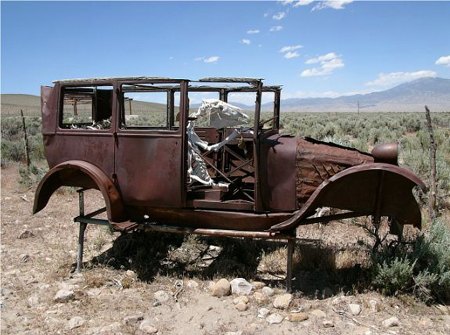General Motors Death Watch 58: Supply Side Economics
A couple of days ago, I was talking to an auto industry analyst about the world's largest automaker. We were discussing the cracks in GM's hull, trying to figure out which of The General's compartments were already breached, which are filling with water and which remain viable. A wistful tone in the analyst's voice indicated head-shaking dismay. "I'm no longer hearing anything positive about GM," he revealed. "The conversations range from how bad it is, to how bad it's going to get." I didn't want to sound like a paranoid fantasist to a new source, so I tried not to out-pessimist the doomsayers. But it wasn't easy.
GM's supply situation is dangerously dire. If former subsidiary and mission critical parts supplier Delphi doesn't reach an agreement with its unionized workers by March 30th — the third and "final" deadline — a judge will void the company's labor contracts. Pundits poo-poo the possibility; they reckon the UAW will make concessions and GM will fork over the necessary union blood money to keep Delphi chugging along. But… over at Tower Automotive, the smaller but equally bankrupt GM supplier tried to cut $1.50 to $3 from their union members' $13 to $15 hourly wages. The United Auto Workers (UAW), United Steel Workers and International Union of Electrical Workers (IUEW) said no. On Monday, a judge will void Tower's union contracts. The inevitable strike will deprive GM's Hail Mary GMT900 SUV's of vital suspension components (amongst other things).
This ominous development reflects the indisputable fact that the UAW and its brother unions are not prepared to surrender a single dime in their salaries, pensions or health care benefits. Not one. Not ever. (I doubt UAW Boss Big Ron Gettelfinger has ever said the word 'concession' in public.) What's more, the unions are literally spoiling for a fight. To wit: members of IUEW will vote today to authorize its leaders to strike Delphi as and when. That's 33,000 Delphi workers ready, willing and able to walk at a moment's notice. It's not posturing; it's preparation.
The unions own GM. If organized labor strikes even one key supplier, they'll be giving The General a 90-day death sentence. While some analysts believe that's no bad thing– the situation forces the unions to accept responsibility for the fate of the company paying its wages, leading them to take the hit needed to keep those wages coming– nothing could be further from the truth. The UAW and its fellow unions are like a cancer: they will feast on their host until it dies. End of story. Why would they walk out on Delphi and send GM into Chapter 11? Because they can. Look at the Rust Belt. How avoidable was that? By the same token, General Motors gives in to union demands when it can't afford to because that's what they do.
GM didn't rush in, bail out Tower and protect its new SUV's because the supplier is only the tip of an iceberg that's gouging a hole in the General's hull. GM's constant efforts to low-ball its suppliers, its poor credit (downgraded by Moody's on Tuesday to B1, five rungs below investment grade) and the looming prospect of bankruptcy are all inflicting fatal wounds to its supply chain. Suppliers are caught in the squeeze between rising commodity costs, declining production (due to lost market share) and contracts that reduce pricing over time. TTAC's Deep Throat reports that an inferior part for the GMT-900 recently forced GM to return to a "quality supplier." The supplier refused to invest its own money to create the part and demanded a contract stipulating that the automaker would pay a true market rate for the finished component.
This is not an isolated case. GM used to provide suppliers an advanced payment program arranged by GE Credit. Late last year, GE bailed on the entire business, in favor of GMAC (yes, the same GM-owned finance company currently on the block). If that wasn't a bad sign of GM's financial situation in and of itself, GMAC then tightened the restrictions. The payment program is no longer available to the broad spectrum of GM suppliers. Bottom line: GM's current procurement process fails to assure parts manufacturers adequate financial compensation, doesn't provide protection against program termination due to budgetary constraints or model "realignment", and can't possibly guarantee payment if GM files for Chapter 11.
It's not too much of a stretch to imagine that at some point, one way or another, GM's entire supply chain will collapse. How's that for dark? You want light? How about this: I've received dozens of emails from frustrated workers, designers and administrators inside GM. No question: there's an enormous amount of creativity and passion locked-up inside General Motors. Once The General shakes off its union, deep-sixes its insufferable bureaucracy, dumps unnecessary brands and gets down to the business of building a limited number of great cars, it will build a limited number of great cars. When it comes to GM, the parts are greater than the whole.
More by Robert Farago
Latest Car Reviews
Read moreLatest Product Reviews
Read moreRecent Comments
- SCE to AUX All that lift makes for an easy rollover of your $70k truck.
- SCE to AUX My son cross-shopped the RAV4 and Model Y, then bought the Y. To their surprise, they hated the RAV4.
- SCE to AUX I'm already driving the cheap EV (19 Ioniq EV).$30k MSRP in late 2018, $23k after subsidy at lease (no tax hassle)$549/year insurance$40 in electricity to drive 1000 miles/month66k miles, no range lossAffordable 16" tiresVirtually no maintenance expensesHyundai (for example) has dramatically cut prices on their EVs, so you can get a 361-mile Ioniq 6 in the high 30s right now.But ask me if I'd go to the Subaru brand if one was affordable, and the answer is no.
- David Murilee Martin, These Toyota Vans were absolute garbage. As the labor even basic service cost 400% as much as servicing a VW Vanagon or American minivan. A skilled Toyota tech would take about 2.5 hours just to change the air cleaner. Also they also broke often, as they overheated and warped the engine and boiled the automatic transmission...
- Marcr My wife and I mostly work from home (or use public transit), the kid is grown, and we no longer do road trips of more than 150 miles or so. Our one car mostly gets used for local errands and the occasional airport pickup. The first non-Tesla, non-Mini, non-Fiat, non-Kia/Hyundai, non-GM (I do have my biases) small fun-to-drive hatchback EV with 200+ mile range, instrument display behind the wheel where it belongs and actual knobs for oft-used functions for under $35K will get our money. What we really want is a proper 21st century equivalent of the original Honda Civic. The Volvo EX30 is close and may end up being the compromise choice.


































Comments
Join the conversation
I suppose this explains why almost everything that makes a GM product function has been Chinese for several years now.